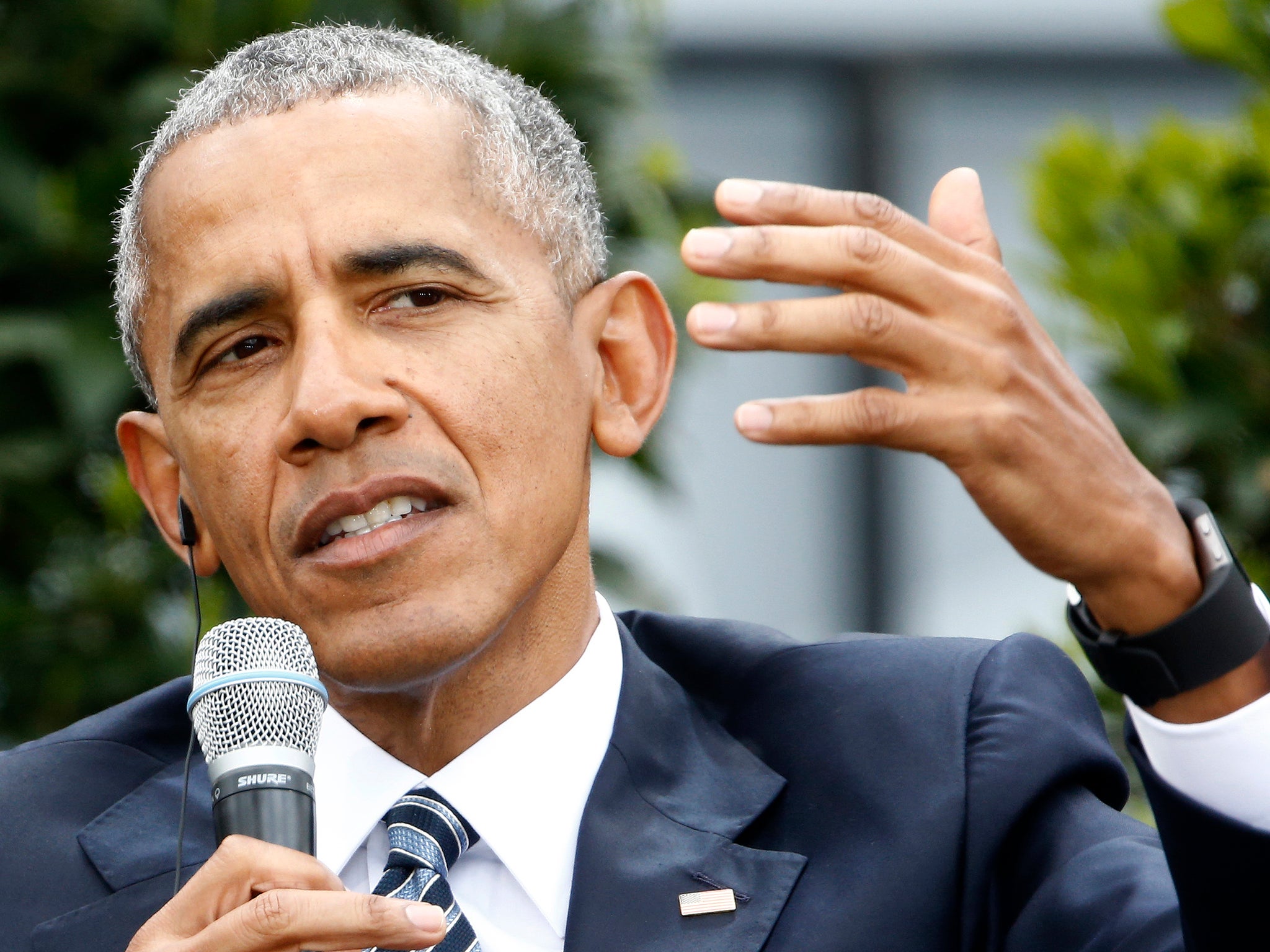Barack Obama calls Trumpcare 'massive transfer of wealth' from poor to rich
The Senate bill to repeal and replace Obamacare is now being reviewed

Your support helps us to tell the story
From reproductive rights to climate change to Big Tech, The Independent is on the ground when the story is developing. Whether it's investigating the financials of Elon Musk's pro-Trump PAC or producing our latest documentary, 'The A Word', which shines a light on the American women fighting for reproductive rights, we know how important it is to parse out the facts from the messaging.
At such a critical moment in US history, we need reporters on the ground. Your donation allows us to keep sending journalists to speak to both sides of the story.
The Independent is trusted by Americans across the entire political spectrum. And unlike many other quality news outlets, we choose not to lock Americans out of our reporting and analysis with paywalls. We believe quality journalism should be available to everyone, paid for by those who can afford it.
Your support makes all the difference.Barack Obama has called the Republican replacement for his signature healthcare legislation, Obamacare, a "massive transfer of wealth" from the poor and middle-class to the wealthy.
The former President and namesake for the existing Affordable Care Act healthcare law took to Facebook to express his concern over the replacement bill set to be voted upon in the Senate that would benefit the wealthy with massive tax cuts as well as pharmaceutical and insurance companies.
Mr Obama wrote that "health care or any other issue, must be something more than simply undoing something that Democrats did".
Mr Obama said that though repealing and replacing Obamacare has become a core issue for Republicans, "we fought for it because we knew it would save lives, prevent financial misery, and ultimately set this country we love on a better, healthier course."
The bill passed the House in May and until 22 June the Senate draft was kept secret from all but a few select Republican Senators by Majority Leader Mitch McConnell.
After the unveiling, four of the majority party's Senators made their dissent public.
“The current bill does not repeal Obamacare,” Rand Paul, one of the four Senators, along with Ron Johnson of Wisconsin, Ted Cruz of Texas, and Mike Lee of Utah, who have said in a joint statement that they're “not ready to vote for this bill.”
With no Democrats planning to support the repeal and replacement, Mr McConnell and party can only afford to lose two members of their 52-48 majority in the Senate in order to pass the bill.
Several Democrats have admitted Obamacare needs fixing, but that abandoning it for the Republican replacement - known formally as the American Health Care Act - is not a viable option.
”The president said the House bill was mean,“ said Senate Democratic leader Chuck Schumer. ”The Senate bill may be even meaner.“
Even Mr Obama wrote: I was careful to say again and again that while the Affordable Care Act represented a significant step forward for America, it was not perfect, nor could it be the end of our efforts.
He said that if Republicans come up with a plan that is "demonstrably better than the improvements we made to our health care system, that covers as many people at less cost, I would gladly and publicly support it."
Mr McConnell said Democrats chose not to help frame the bill.
”I regret that our Democratic friends made clear early on that they did not want to work with us in a serious, bipartisan way to address the Obamacare status quo. But Republicans believe we have a responsibility to act, and we are,“ Mr McConnell said.
A number of Republicans such as Susan Collins and Maine said it was “too soon” to judge the bill until they had had a chance to read it. Veteran Senator John McCain said the draft bill was better than Obamacare in "100 ways," but like many Senators wanted to study the bill further and consult with his state's governor.
States with a large population receiving Medicare, health insurance for seniors, or Medicaid, government-subsidised insurance for low-income or disabled people, may be negatively affected by the bill in its current draft.
With a third of the Senate coming up for re-election in 2018, many will have to weigh the state-wide implications before voting for the bill.
Mr Obama also wrote that politics could not get in the way of the "compromise" needed between Republicans and Democrats in order to not "put the American people through [the] pain" of being excluded from benefits while pregnant or sick, expensive bills, or high deductibles "while giving billionaires and corporations a massive tax cut in return".
The nonpartisan Congressional Budget Office (CBO) has estimated that the House version of bill would leave 23 million people uninsured. It is expected to run the same calculations on number of insured and cost of premiums for the Senate draft bill early next week.
Mr McConnell is reportedly looking to schedule a vote on the bill sometime before the 4 July Congressional recess, which does not give much time to deliver what Mr Obama called "the kind of leadership that appeals to Americans across party lines."
Subscribe to Independent Premium to bookmark this article
Want to bookmark your favourite articles and stories to read or reference later? Start your Independent Premium subscription today.
Join our commenting forum
Join thought-provoking conversations, follow other Independent readers and see their replies
Comments